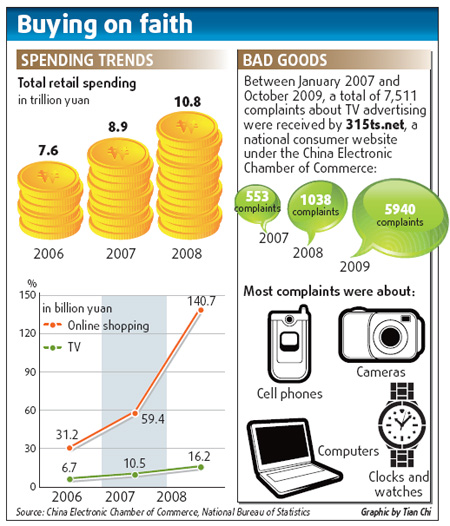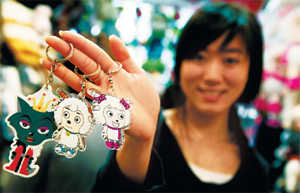Biz Unusual
Cutting off criminal channels
By Hu Yongqi (China Daily)
Updated: 2009-12-01 08:00

Following the Sept 21 notice, several stations scrapped all direct-response advertising. A Zhejiang TV employee told China Daily the station has stopped running the commercials "even though it has cost us a lot of money".
But infomercials have not disappeared entirely and many still litter the schedules, promoting hair-loss creams and cell phones, which are usually pirated copies of well-known brands like Nokia, Apple and Motorola.
The China Advertising Association publicly condemned 58 illegal infomercials on Sept 25 after an investigation by the State Administration of Industry and Commerce.
It was the fifth time the association has spoken out against bad advertising since 2006. But "as an industry association, all we can do is monitor and speak out after illegal programs have been aired", said Yang Hongsheng, vice-chairman of the association. "We cannot prevent commercials from being broadcast in the first place."
Most of the programs mentioned in the latest notice were for products hosts claimed could cure illness, help people lose weight or remove scars. None of the advertisers were punished, despite the Law on Advertising stating that violators should face heavy fines.
Zeng Jingping, an expert with the China TV Sales Research and Development Center, added: "China has a huge potential market for TV shopping but we need better regulation to make sure products are genuine."
Home shopping channels and infomercials generate 8 percent of all retail sales volume in the United States, and more than 10 percent in South Korea. In China, it is little over 0.1 percent, and Zeng blamed the lack of consumer confidence in China for hampering its development.
He told the Next Generation Internet and Developing China Summit in Beijing in August that the government is working to set up an advertising standards agency, similar to those already monitoring television and radio in the US, Britain and Japan.
The center would soon begin publicizing tracking information for all television advertisements, meaning rogue operators would have nowhere to hide, he said.
|
|||
Wang Xueming, a Beijing judge in her 30s, said she has twice bought products after watching late-night infomercials: a "slider" cell phone and skin-whitening cosmetics.
"My friends think I am a little naive for buying from television shows but I don't mind," she said. "Sometimes goods in the shops don't meet our expectations either, so it's good that we have choice. Although it's important that someone is making sure what is sold on TV is good quality and genuine."
A consumer study last year by Beijing-based media research company CSM suggested only 17 percent of television viewers trust direct-response advertisements, while more than 94 percent of viewers aged 25 to 60 immediately switch channels when they see an infomercial.
"I like infomercials, but I can't say why," said a 35-year-old Beijing resident surnamed Cui. "Maybe it is because of all the shouting and strange facial expressions. I don't buy any of their products, of course. I just watch for fun."













